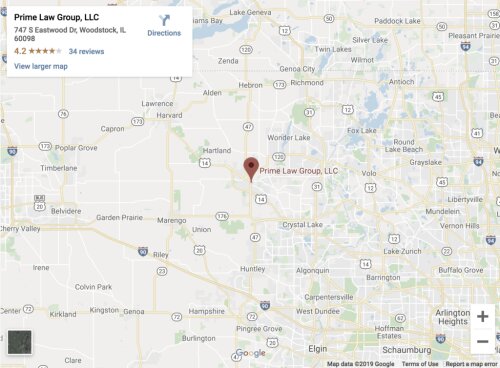Best Business Lawyers in Alabama
Share your needs with us, get contacted by law firms.
Free. Takes 2 min.
Or refine your search by selecting a city:
List of the best lawyers in Alabama, United States
United States Business Legal Questions answered by Lawyers
Browse our 1 legal question about Business in United States and read the lawyer answers, or ask your own questions for free.
- How do I legally protect my idea before selling or licensing it to a company?
- I have a makeup product idea that I want to sell or license, not the product itself. It is influenced by a product that was recently launched. Therefore, I want to sell/license to the company that launched said product. After some research, I contacted a patent attorney who explained that... Read more →
-
Lawyer answer by P.O OHIKHENA & Co
Good day,A patent will not be applicable since it's still an idea. You can go into an MOU(Memorandum of understanding) with the said company and also an NDA.You can contact me for my insight. Visit our profile and send us...
Read full answer
United States Business Legal Articles
Browse our 2 legal articles about Business in United States written by expert lawyers.
- NY 2026 Corp Tax: Thresholds & Franchise
- For tax years beginning on or after January 1, 2026, New York businesses will only be required to make estimated tax payments if their expected New York tax (including any MTA surcharge) is at least $5,000, up from $1,000. Many small and some mid-sized New York corporations and S corporations... Read more →
- Texas AI Compliance 2026 United States Data Privacy Rules
- By 2026, Texas agencies and many businesses that build, host, or support AI tools for government or consumer-facing decisions will face stricter disclosure and anti-discrimination requirements. Texas is pairing its new data privacy framework (Texas Data Privacy and Security Act) with AI-specific rules that target "algorithmic discrimination" in areas like... Read more →
About Business Law in Alabama, United States
Business law in Alabama covers the rules, regulations, and legal principles that govern how businesses operate within the state. Whether you are starting a new business, hiring employees, signing contracts, or considering expanding, Alabama law dictates how businesses are structured, managed, and dissolved. This body of law addresses everything from formation and licensing to liability, taxation, and compliance with both state and federal regulations. Understanding business law in Alabama is essential for entrepreneurs, business owners, and anyone engaging in commercial activity in the state.
Why You May Need a Lawyer
There are many situations where legal assistance can benefit individuals and companies involved in business activities in Alabama. Some common scenarios include:
- Choosing the right type of business entity, such as an LLC, corporation, or partnership
- Registering your business and securing the necessary licenses and permits
- Drafting or reviewing contracts, including leases, employment agreements, and sales contracts
- Resolving disputes with customers, partners, or competitors
- Navigating mergers, acquisitions, or dissolutions
- Understanding local and federal tax obligations
- Ensuring compliance with labor and employment laws
- Handling intellectual property protection, such as trademarks and copyrights
- Dealing with regulatory investigations or litigation
- Protecting your personal assets from business liabilities
A lawyer can help you understand your rights and obligations, draft legally enforceable documents, reduce risk, and represent you in disputes or negotiations.
Local Laws Overview
Alabama has specific requirements and statutes that impact business operations. Key legal considerations for businesses in Alabama include:
- Business Formation - Alabama businesses can be structured as sole proprietorships, partnerships, limited liability companies (LLCs), corporations, or other entities. Each has unique legal and tax implications.
- Registration Requirements - Most businesses must register with the Alabama Secretary of State. Some professions require additional state or municipal licenses.
- Taxation - Alabama levies a state income tax, business privilege tax, and sales taxes. Businesses may also be liable for local taxes depending on their location and activities.
- Employment Law - Employers must comply with both Alabama and federal laws regarding minimum wage, workplace safety, discrimination, and employee rights.
- Contract Law - Alabama uses the Uniform Commercial Code for most commercial transactions, but some contracts have unique state requirements, especially related to real estate and lending.
- Licensing and Regulations - Certain industries are highly regulated, such as health care, construction, and financial services. Failure to comply can lead to penalties or business closure.
- Liability and Asset Protection - Business entities like LLCs and corporations can protect owners from certain liabilities, but proper structuring and documentation is crucial.
Frequently Asked Questions
What type of business entity should I choose in Alabama?
The best structure depends on your goals, risk tolerance, tax situation, and number of owners. Common choices include LLCs, corporations, and sole proprietorships. An attorney can help assess your needs and guide your decision.
How do I register a business in Alabama?
Most businesses must register with the Alabama Secretary of State. You may need to file formation documents, obtain a business license, and register for state taxes. Requirements vary by locality and business type.
Do I need a state business license in Alabama?
Many businesses need a state license, while others are regulated at the local or county level. Certain professions, such as contractors and health care providers, have specific state licensing requirements.
What taxes does a business pay in Alabama?
Businesses may be subject to income taxes, business privilege tax, sales and use taxes, and other local levies. The specifics depend on your entity type, business activities, and location.
How can I protect my personal assets from business liabilities?
Forming an LLC or corporation can protect owners from certain business debts and lawsuits, as long as the business is properly structured and operated according to state law.
Are employment laws different for businesses in Alabama?
Alabama follows both state and federal employment laws. These include regulations on wages, discrimination, workplace safety, and employee rights. It's important to familiarize yourself with both sets of laws.
What happens if I do not comply with business regulations in Alabama?
Non-compliance can lead to fines, penalties, lawsuits, or even closure of your business. It's important to stay up to date with all state and local rules that apply to your industry.
Do I need a written contract for my business deals?
While not all business agreements must be in writing, having written contracts helps clearly define the rights and obligations of all parties and provides legal protection in case of disputes.
How do I handle a business dispute in Alabama?
First, try to resolve the issue through negotiation or mediation. If that is not successful, a lawsuit in state or federal court may be necessary. An attorney can advise you on the best approach.
Where can I get help starting or running my business?
Numerous public and private organizations provide assistance with business formation, compliance, and development in Alabama. See the additional resources section below for examples.
Additional Resources
If you need more information, the following resources can be beneficial:
- Alabama Secretary of State - Information on business filings, entity searches, and official forms
- Alabama Department of Revenue - Guidance on business taxes and reporting
- Alabama Small Business Development Center Network - Offers workshops, business counseling, and training
- Alabama State Bar Association - Provides lawyer referral services and resources for business owners
- Local city or county business licensing offices - Key for location-specific permits and compliance
- U.S. Small Business Administration (SBA) - Federal advice and support for new and existing businesses
- Local chambers of commerce - Networking, advocacy, and informational seminars
Next Steps
If you are thinking about starting a business, facing a legal issue, or want to ensure compliance with Alabama's laws, consider these next steps:
- Clearly define your business goals and structure
- Gather any existing business documents, contracts, or official correspondence
- Contact an attorney who specializes in Alabama business law to discuss your situation
- Research state and local regulations that apply to your industry or location
- Use resources from state agencies and business organizations to stay up-to-date
Legal advice can help you avoid costly mistakes, protect your interests, and set your business up for long-term success. Consider consulting a qualified business lawyer to help guide you through the legal landscape specific to Alabama.
Lawzana helps you find the best lawyers and law firms in Alabama through a curated and pre-screened list of qualified legal professionals. Our platform offers rankings and detailed profiles of attorneys and law firms, allowing you to compare based on practice areas, including Business, experience, and client feedback.
Each profile includes a description of the firm's areas of practice, client reviews, team members and partners, year of establishment, spoken languages, office locations, contact information, social media presence, and any published articles or resources. Most firms on our platform speak English and are experienced in both local and international legal matters.
Get a quote from top-rated law firms in Alabama, United States — quickly, securely, and without unnecessary hassle.
Disclaimer:
The information provided on this page is for general informational purposes only and does not constitute legal advice. While we strive to ensure the accuracy and relevance of the content, legal information may change over time, and interpretations of the law can vary. You should always consult with a qualified legal professional for advice specific to your situation.
We disclaim all liability for actions taken or not taken based on the content of this page. If you believe any information is incorrect or outdated, please contact us, and we will review and update it where appropriate.
Browse business law firms by service in Alabama, United States
Alabama, United States Attorneys in related practice areas.
Browse business law firms by city in Alabama
Refine your search by selecting a city.
















